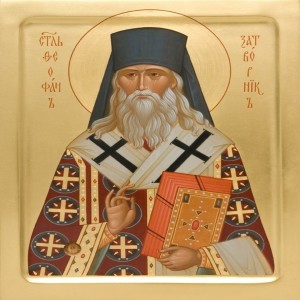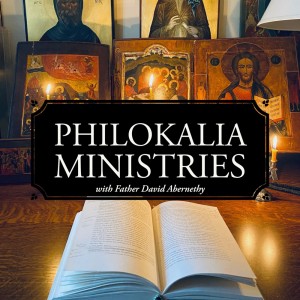
It was an extremely powerful group this evening; as one might expect in a discussion about the passions. In letter 54, Saint Theophan begins to instruct Anastasia about the nature of the passions and where they spring from in our lives. Theophan tells her that they are not part of who we are as human beings. They can be removed without destroying the soul. In fact, he instructs her that unless we drive them out they will leave a person in ruins. When they control a human being - in many respects they become more like an animal. Their will and their consciousness are driven and controlled by what is not in accord with nature and with how God has created us. The passions, according to Theophan, arise out of the desire to please one’s self, selfishness and pride. The passions are sustained by these. When we give ourselves over to them we are dragged along like a young ass on a cord behind its owner. Therefore, the Saint tells Anastasia that she must not be sparing with herself. She has been controlled by these passions even though that they have not dominated her life. He would have her understand our capacity for self-pity and so also our capacity for self-deceit. The passions can seem and make themselves seem attractive. Thus, we must, in accordance with the Scriptures, be sober and vigilant. We must watch and pray. It is this radical alertness the keeps us from falling victim to the relentless attack of the evil one which can be direct or very subtle. When you look inside of yourself you will see all the many subtle attachments that keep you from embracing the will of the Lord. This is the first thing in the struggle with the passions and she must learn this lesson well.
---
Text of chat during the group:
00:17:12 Fr. John (Ivan) Chirovsky: the best modern day book on the passions is: Therapy of Spiritual Illness: An Introduction to the Ascetic Tradition of the Orthodox Church (Therapy of Spiritual Illness, I,II,III boxed set) Paperback – January 1, 2012 by Dr Jean-Claude Larchet
00:17:23 Fr. John (Ivan) Chirovsky: you can get it in paperback
00:17:44 Erick Chastain: I love those books!
00:38:03 Eric Williams: How, then, do we avoid the heresy of quietism?
00:45:18 Eric Williams: Sorry for being generic. ;)
00:54:23 Eric Williams: Fair point :)
00:57:10 Erick Chastain: LOL I really didn't intend to sidetrack us big time like this
00:57:29 Lilly Crystal: All amazing points :)
00:59:31 Fr. John (Ivan) Chirovsky: It is to be remembered that there is a secular definition of “passion”, for example: “Passion is a feeling of intense enthusiasm towards or compelling desire for someone or something. Passion can range from eager interest in or admiration for an idea, proposal, or cause; to enthusiastic enjoyment of an interest or activity; to strong attraction, excitement, or emotion towards a person” (Wikipedia). Thus, we have the Western Christian definition in the Catechism of the Catholic Church, § 1767, 1773, where a “passion” is a morally neutral concept.
00:59:50 Fr. John (Ivan) Chirovsky: In the Eastern Christian definition, used here, and in the official catechism of the UGCC: Christ Our Pascha § 795, “passion” is always a vice, one of the eight capital sins. In the East, a “passion” (from pathos in Greek) is any deadly obsession that seems to be beyond our ability to control, let alone to recognize, in ourselves. “Passions” arise from “logismoi”, literally “thoughts”, that act on and overcome people, becoming habits of thinking, feeling-willing, and desiring over which we have little or no control. Thus, a passion is any spiritual “cancer”, poetically described as a “death-bearing” or “soul-corrupting” sin.
01:00:09 Fr. John (Ivan) Chirovsky: Those Eastern Church Fathers, whose works were written between the 4th and 15th centuries and collected and published in the Philokalia-Добротолюбіє, list “by name a total of 248 passions and 228 virtues” (see English language edition, page 205, Volume 3). The Greek word “pathos” can also mean and be translated as “sufferings, desires, energies, zealous activities, cravings” depending on its context.
01:01:33 Lisa Weidner: Thank you, Fr John
01:02:19 Fr. John (Ivan) Chirovsky: In 375 AD, Archdeacon Evagrius of Pontus (c. 346-399) developed a com¬pre¬hen¬sive list of eight evil assaulting “thoughts” (Greek: logismoi, Ukrain¬ian: помисли). Through the centuries this was systematized in the East by various saints, mostly St. Maximos the Confessor (590-662). The assaulting “thoughts” act on and over¬come people, becoming habits or compulsions of thinking, feeling-willing, and desiring over which we end up having little or no control. At this point, the “thoughts” are said to have become “passions” (Greek: pathеа, Ukrainian: пристрасті).
01:02:49 Fr. John (Ivan) Chirovsky: In the East, the passions are a distortion, deprivation or misdirection of the intellective, appetitive and incensive powers of the soul. See Tables at: http://ocampr.org/wp-content/uploads/2011/03/the-christian-ascetic-tradition-on-dejection-and-despondency-david-holden-2004.pdf. The “passions” enslave us and thereby are the chief cause of our sufferings. In liberating us from sin and the effects of sin, our Lord delivers us from our passions as well as the pain which they cause. St. Gregory the Dialogist (Pope of Rome from 590-604) would revise Evagrius’ list to form what, in the West, is today more commonly known as “the Seven Deadly Vices”, or Sins.
01:03:14 Fr. John (Ivan) Chirovsky: St. John “of the Ladder” (Climacus, 579-649) was of the opinion that although the passions (пристрасті) were not directly created by God, they are still naturally good, except for akedia-listlessness, despondency. In Step 26, 156, of his Ladder of Divine Ascent, he writes: “Nature gives us the seed for childbearing, but we have perverted this into fornication. Nature provides us with the means of showing anger against the serpent, but we have used this against our neighbour. Na¬ture inspires us with zeal to make us compete for the virtues, but we compete in evil. It is natural for the soul to desire glory, but the glory on high. It is natural to be over¬bearing, but against the demons. Joy is also natural to us, but a joy on account of the Lord and the welfare of our neighbour. Nature has also given us resentment, but to be used against the enemies of the soul. We have received a desire for food, but not for profligacy.”
01:03:29 Fr. John (Ivan) Chirovsky: It is when we use our free will to misdirect the passions from the good towards the evil, that we allow the passions to gain control over us. This, in turn, is how the thieves, or demons, are empowered by us to rob us of eternal life. A helpful passage on this latter point regarding what demons do, is to be found in the homily at: https://www.holycross-hermitage.com/blogs/articles-sermons/sermon-for-the-sunday-of-st-john-climacus-2017
01:13:51 Mark Cummings: I hope he was talking to a do
01:13:53 Mark Cummings: dog
01:15:22 renwitter: Mark! :-D Hahhaha. LOL
01:19:19 Lilly Crystal: Pray, Hope and Don’t Worry! -Padre Pio
More Episodes
 2023-11-28
2023-11-28
 1.1k
1.1k
 2023-11-20
2023-11-20
 1.2k
1.2k
 2023-11-13
2023-11-13
 1.1k
1.1k
 2023-11-09
2023-11-09
 1.2k
1.2k
 2023-11-06
2023-11-06
 1.1k
1.1k
 2023-10-31
2023-10-31
 952
952
 2023-10-26
2023-10-26
 1.2k
1.2k
 2023-10-24
2023-10-24
 1.1k
1.1k
 2023-10-13
2023-10-13
 1.4k
1.4k
 2023-10-10
2023-10-10
 1.1k
1.1k
 2023-09-28
2023-09-28
 1.5k
1.5k
 2023-09-26
2023-09-26
 1.2k
1.2k
 2023-09-19
2023-09-19
 1.1k
1.1k
 2023-09-11
2023-09-11
 1.1k
1.1k
Create your
podcast in
minutes
- Full-featured podcast site
- Unlimited storage and bandwidth
- Comprehensive podcast stats
- Distribute to Apple Podcasts, Spotify, and more
- Make money with your podcast
It is Free
- Privacy Policy
- Cookie Policy
- Terms of Use
- Consent Preferences
- Copyright © 2015-2024 Podbean.com




